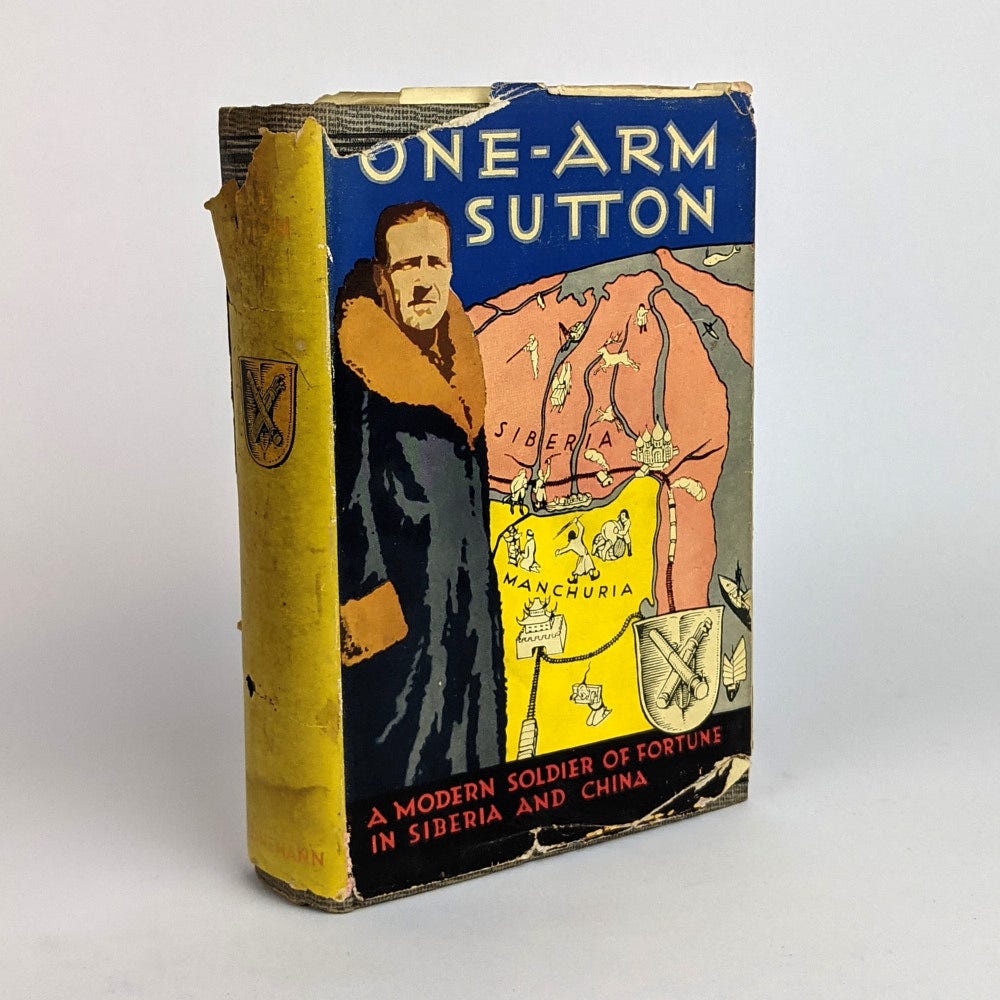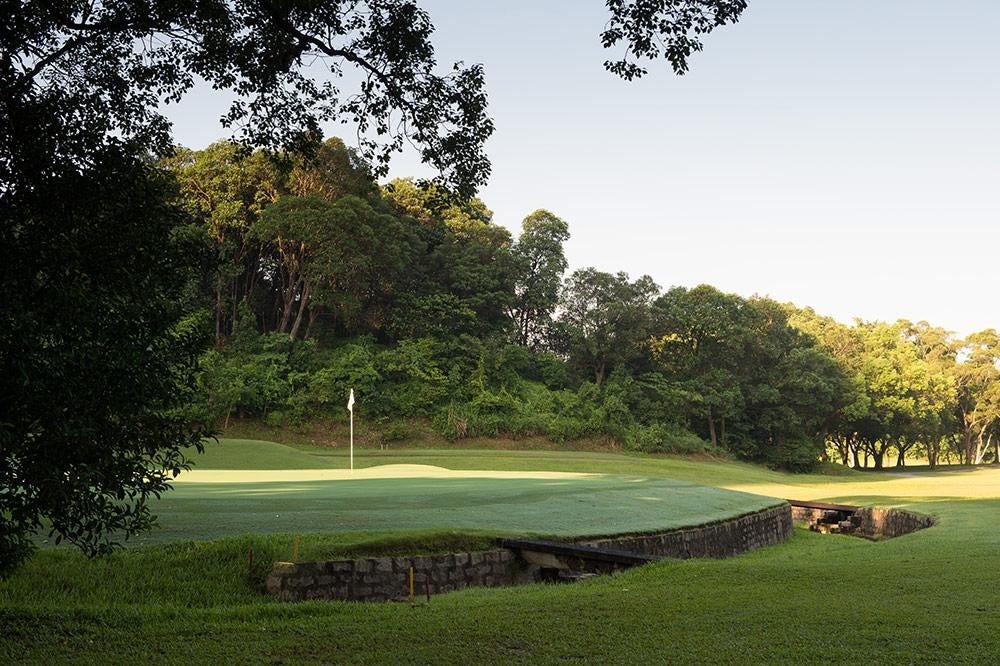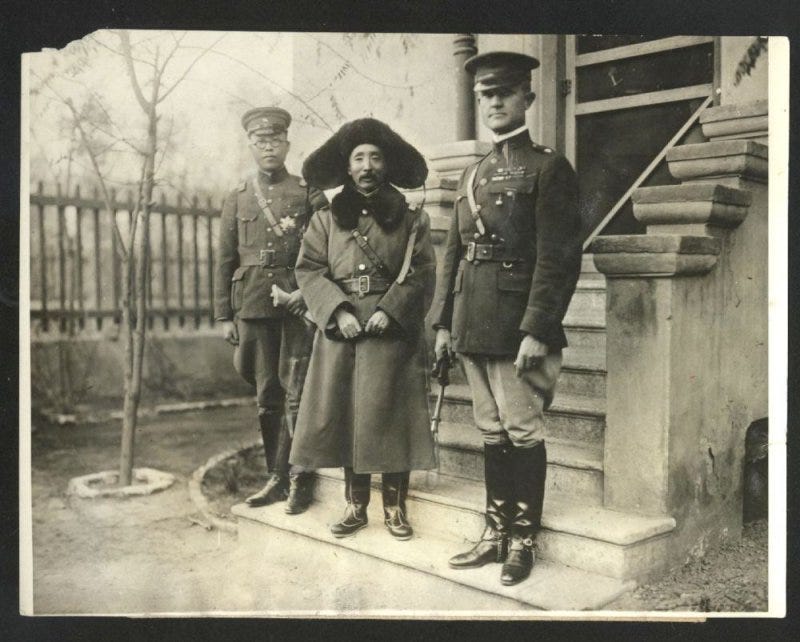One-Armed Bandit
Meet the extraordinary Francis Arthur 'One-Arm' Sutton: talented golfer, engineer, soldier, entrepreneur, adventurer and mercenary - sometimes all at the same time
In the lead up to the wartime occupation of Hong Kong in late 1941, a remarkable golf match took place over the venerable Old Course at the Hong Kong Golf Club in Fanling. The match pitted Major Melville-Smith, the Instructor of Gunnery to the British garrison, against Francis (Frank) Arthur Sutton, an Eton-educated engineer who found himself in Hong Kong having been expelled from Korea by the Japanese a few months earlier. The match was unusual in that each man had only one arm; the 18-hole contest was seen as the coming together of two of the most prominent disabled golfers in Asia.
Frank won, although this probably wasn’t so much of a surprise. Before having his right hand and forearm blown off at Gallipoli 25 years earlier, he was a scratch player, winning myriad events including the 1907 Argentina Amateur Championship at the then Buenos Aires Golf Club. Despite his impairment, Frank, a tall, muscular man, could still drive the ball in excess of 200 yards and was a fine putter. He was fanatical about the game and took his clubs everywhere he went. They even made their way with him to the unendurable hell that was Gallipoli, wrapped in canvas and marked ‘theodolite legs’. In his rollicking 1933 autobiography, One-Arm Sutton, Frank proffered this explanation: “I took my golf bag ashore with me, because, after all, you never know …”
Born into a well-to-do family in the English Midlands in 1884, Frank spent two years studying engineering at the University of London before travelling to South America to build railway lines through the malaria-ridden swamps and sub-tropical rainforests of Paraguay and Argentina. A fleeting trip back to England in order to get married (his autobiography neglects to mention to whom), Frank went on to Mexico to help construct one of the country’s earliest oil refineries alongside a bunch of rowdy Texans. But then Archduke Franz Ferdinand was assassinated in Sarajevo and war was declared. “Here was an adventure, and a cause that suited me,” he wrote.
Awarded the Military Cross for his gallantry in Turkey, Frank accepted the loss of his limb admirably. “I promised myself that no man should ever hear me complain, and that I should learn to shoot with my left, that I would play golf with it, and that I could be instructed to sign my name. After all, I was alive.” With real-world understanding that the Turkish Army mortars were superior to those of the British, he spent his recovery time adding to his munitions and ballistics expertise, inventing various heavy trench mortars and new fuse systems. These he was able to sell to the Americans, earning a considerable fortune for his designs.
With peace – of a fashion – restored in Europe, Frank headed east, investing his money in a gold-dredging business in Siberia, settling in Blagoveshchensk, an important river port on the border with China, some 1,400km from Vladivostok. Here, Frank amassed great wealth, although things swiftly changed upon the arrival of the Red Army, who took control of the city in 1921, resulting in the exodus of his White Russian hosts.
Charismatic and certainly pragmatic, Frank was able to charm the Red Army Commissar into generously paying him off for his confiscated dredging equipment and crossed the Amur River into China at Heihe, eventually making it to Sichuan where he fell into the employ of General Yang Sen, military Governor of Chung King (Chonqing), as Director of Munitions.
This was China’s Warlord Era and Frank, who had been given 200 men and a rudimentary factory in which to work in, was churning out weaponry at a great rate of knots for Yang Sen. But as was the age, things changed quickly, and with China’s Third Army on his tail, Frank headed north to Manchuria.
In Mukden, modern-day Shenyang, Frank fell in with arguably the most famous warlord of them all – Chang Tso-lin (Zhang Zuolin), who made him an advisor and bestowed upon him the rank of Major-General after an especially successful battle which resulted in the capturing of the Great Wall. Frank stayed with Chang, whom he genuinely admired, for three years, producing munitions and providing strategic military guidance until it was time once again to make a move.
By the late 1920s, Frank had amassed a considerable fortune and headed where any fellow with money would: Swinging Shanghai, now an international enclave home to an expatriate population of over 60,000. Frank threw himself into life, even buying a racehorse, Bengal the Wonder Pony, which would win 41 of his 42 races including the highly lucrative Champions Sweepstake.
But life as a mercenary quickly catches up with you and Frank decided to leave China before his luck ran out.
By 1928, Frank was in Canada and eager to invest what he had in becoming a real estate developer, which included buying Vancouver's tallest building of the time - the elegant 10-storey Rogers Building on Granville Street. Little did he know but this proved a wholly disastrous course of action; the Wall Street Crash of the following year, followed by the Great Depression, saw him lose everything that he had worked, fought and bled for during the last 20 years. Some 500,000 British pounds!
Frank was down but not completely out. He sold all his possessions, paid off his debts and with a few thousand dollars in hand, he began travelling across the United States to search for sponsorship for arms deals to China.
How successful he was at this is unclear. His old warlord boss, Chang, had died in 1928, and although Frank made another trip to China in 1932, presumably in an effort to try and sell his expertise to new leaders, his whereabouts were not recorded again until 1941 when, pretending to be a journalist, he was picked up in Korea by the Japanese and deported to the nearest British outpost – Hong Kong!
As it happens, Frank’s match against Meville-Smith at Fanling proved to be his last ever game of golf. The subsequent Japanese occupation of Hong Kong, which included turning the Fanling clubhouse into a regional army headquarters, meant the game was off the menu for many years to come.
Sadly, Frank, who like many Brits was sent to the Stanley Internment Camp on the south side of Hong Kong Island by the invading forces, succumbed to dysentery on 22 October 1944 at the relatively youthful age of 60, some 10 months before British control over the territory was eventually restored.
He is buried in Stanley Military Cemetery, a simple headstone marking the spot.









Great story about great people !
Interesting story. A similar character to Two-Gun Cohen.